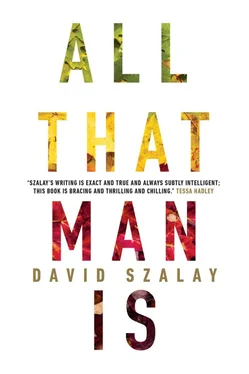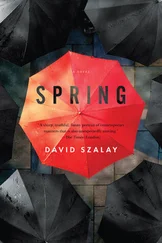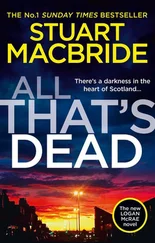There is a silence.
Wondering what to say next, Balázs has another go at his coffee cup.
Unable to think of anything, he offers her a Park Lane, which she takes. He lights it for her. There is a simple glass ashtray on the aluminium tabletop.
Then he says, ‘I thought I might have a look round today. See some sights or whatever.’ He had hoped she would show some immediate enthusiasm for this idea but she doesn’t. Sitting on the other side of the little round table in a sleeveless top that shows the tattooed sprig of barbed wire encircling her slender upper arm, she just takes a pull of the Park Lane and says nothing. ‘There must be loads to see here,’ he says. When she still doesn’t play along, he opts for a more direct approach, and asks, ‘There anything you want to see? While we’re here.’
She sort of laughs. ‘I don’t know.’
The laugh is very discouraging, and he is about to drop the whole subject, when she says, without seeming interested, ‘What is there?’
‘Well, uh.’ He tries to sound spontaneous. ‘There’s some waxworks place, isn’t there?’
‘Oh, that.’ She seems a lot less into it than Gábor had suggested.
‘What about that?’ he suggests.
She says she doesn’t know where it is.
He says it wouldn’t be a problem to find out.
She seems amused now. She is smiling at him as if he amuses her. ‘Are you really interested?’
He shrugs. ‘Yeah,’ he says. ‘Why not?’
‘I don’t know,’ she says. ‘You don’t seem like that sort of person.’
‘What sort of person?’
Still evasively smiling, she says, ‘You know what I mean.’
‘The sort who’s interested in waxworks?’
‘Yes.’
‘I’m interested in waxworks,’ he says, implausibly. And then, seeing an opening, ‘What sort of person do I seem like?’
She ignores the question. ‘What time is it?’
He looks at his watch, its muddle of intersecting dials, most of which seem to have no function, and tells her.
‘You’re really interested?’ she asks.
And with a totally straight face, he says, ‘Yeah.’
—
They have to take the underground, and he enjoys, standing in the noisy train, the envy of the other men, the way they watch her in her tall shoes and torn denim. She seems not to notice that she is being looked at, or to notice anything, as she sways with the movements of the train, her sunglasses fixed on some advertisement for a dating service or hair-loss product, or the diagram of the line.
She had said to Balázs, while they were waiting on the platform at Finsbury Park, that she was impressed by his English. Where had he learned it? ‘Iraq,’ he said, surprisingly, and he told her, while they waited, about his time there. He didn’t try to pretend that it had been exciting, or even very interesting. He had spent more or less the entire time in various town-sized bases, playing computer games in plain, air-conditioned rooms and eating American food. He had spoken to not a single Iraqi — except one interpreter who had tried to sell him drugs — and had never fired his weapon. He had done some patrols, though even that only involved travelling around in an armoured vehicle, peering through a tiny window at the flat, beige land. Nothing had ever happened. His most abiding memory, he tells her, was of the heat, the way it took you the moment you stepped out of the air conditioning, the instant watery profuseness of the sweat.
Standing on the up escalator at Baker Street Station, he asks her which famous person she is most looking forward to seeing in the museum. Her answer does not please him. He fucking hates Johnny Depp and those pirate films he is in. More than that, it seems possible that in selecting Depp, she was sending a deliberate message that he, Balázs, was ‘not her type’, that he shouldn’t get any ideas. (Why hadn’t she said Bruce Willis?) He wishes he hadn’t asked her the question, and doesn’t speak again as they leave the station.
Out in the sunlight at street level, they look for the museum. When they find it, the queue of people waiting ‘to meet the stars’ is shocking. Where it starts, far up a side street, there is a sort of diffuse, subsidiary queue of people wondering whether to join the main queue, which is marked, every twenty metres or so, with signs indicating how long the wait will be from that point — Approx. 2½ hrs is the first, though that itself is quite far from where the queue is now being supplied with new material. Further ahead — in the vicinity of Approx. 1 hr — mime artists and a man on stilts attempt to entertain distraught and exhausted children.
Balázs, absorbing the situation with weary stoicism, takes his place in the queue. He is docile and long-suffering when it comes to queuing — he takes a sort of joyless pride in waiting his turn, and in not being deterred by having to do so.
‘We’re not really going to wait, are we?’ she says, standing beside him.
‘Well…’
She laughs. ‘I mean, we’ll be here for hours.’
‘Yeah,’ Balázs agrees.
‘Do we really want to do that?’
‘I dunno.’
She folds her arms and they stand there for a minute or two in the fresh shade of the early-summer morning, a minute or two during which the queue does not move at all, and Balázs senses a souring of her mood — she has started to frown at her own feet. ‘Shou’ we do something else then?’ he ventures, lighting a Park Lane.
‘Like what?’ she asks.
He shrugs, looks uninspired.
‘We could just walk a bit,’ she suggests.
There is a glimmer of green at the end of the side street and they start to walk towards it, initially in silence.
Just as the silence is threatening to turn awkward, she says, ‘When did you get back from Iraq?’
‘Uh.’ He has to think for a moment. ‘Eight years ago.’
It seems amazing — awful — that eight years have passed since then.
In fact it is more — it was December 2004, that winter day, the windy airfield. Home. ‘Eight and a half,’ he says, making the amendment. He was twenty then, had been in the army since he was eighteen. He tells her that he stayed in the army for a year or two after that.
‘And what have you been doing since then?’ she asks. ‘Working at the gym?’
‘Yeah,’ he says, ‘working at the gym, and some other things.’
‘What sort of things?’
‘I was a security guard for a bit.’ He asks her if she knows a particular Tesco in Budapest. She says she does. ‘There,’ he says.
The subject seems likely to peter out at this point, and then she says, ‘What was that like?’
What was that like? Well, there was the humid nylon pseudo-law-enforcement uniform, the hours of loitering near the entrance, the dull CCTV screens of the security station. ‘It was okay,’ he says.
They have arrived at a perpendicular street. On the other side is a stunning cliff face of pristine cream houses, through a wide opening in which the green trees of a park are visible. The street they are walking down goes through the opening, where it acquires a red tarmac cycle lane, and on into the park. They wait at the lights while the traffic streams past. This place, he thinks, staring at the high houses while they wait, is made of money. He says, ‘I got sacked in the end. From Tesco.’
‘Why was that?’
‘Suspected collusion with shoplifters,’ he says.
‘Suspected?’
‘Yeah, suspected. I didn’t collude with anybody.’
‘Why did they suspect you then?’
‘Well, they were losing a lot of stuff. So I wasn’t much good at the job anyway.’ It was true that he had had a tendency to fall for what turned out to be diversionary tactics. The staged scuffle, the fake heart attack, the swarthy old woman selling violets, the old man with the never-ending story. He was probably a soft touch that way. That might have been what the manager thought too. Still, it’s easier to sack someone for being dishonest.
Читать дальше












